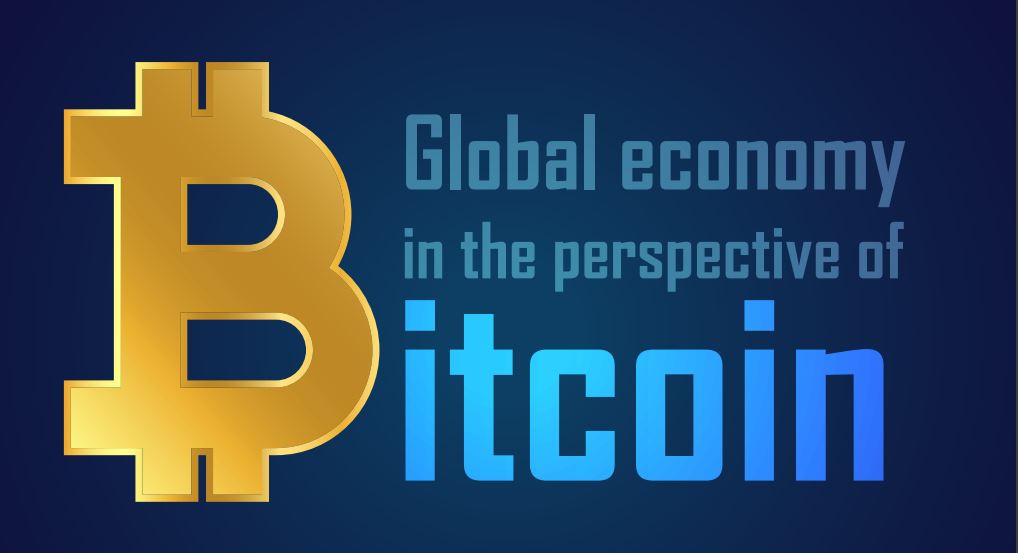Bitcoin, the world’s most expensive cryptocurrency, is a decentralized digital currency, without a central bank or single administrator, which can be sent from user to user on the peer-to-peer bitcoin network without the need for intermediaries. It was invented by an anonymous person(s) or group of people using the name Satoshi Nakamoto in 2008 whose identity is still unknown to the world. At first, many economists, influential personnel and trade leaders thought the concept of Bitcoin to be merely an obscure hobby or a pipe dream which will get overshadowed or die down within the next few years. But today, the story is quite different. Bitcoin as a cryptocurrency has made its trend in the global economy as an emerging medium of transaction and a real investment opportunity.
Bitcoin made a strong impact on the global economy and gained a lot of attention when its price hiked from around 572.3 USD in August 2016 to approximately 4764.8 USD in August 2017. It makes up about 64.01% of the total value of all cryptocurrencies as of 9 March 2019 with more than 7.1 million active users
Transactions that are made through bitcoins are verified by network nodes through cryptography and recorded in a public distributed ledger called a blockchain. It is an immutable time-stamped series record of data that is distributed and managed by a cluster of computers.
Most people often get confused between blockchain and bitcoin. But there is a huge difference between these two. Bitcoin is a cryptocurrency, while blockchain is a distributed database. Bitcoin is powered by blockchain technology, but blockchain has got many uses beyond Bitcoin. Moreover, Bitcoin promotes anonymity, while blockchain is all about transparency. To be applied in certain sectors (particularly banking), blockchain has to meet strict Know Your Customer rules. Furthermore, Bitcoin transfers currency between users, while blockchain can be used to transfer all sorts of things, including information or property ownership rights.
Bitcoin has some properties that authorized money, and other traditional currencies don’t. It is called a ‘digital currency’ because of its existence in digital form only, and there is no physical shape or form such as cash. So technically it can only be stored in a digital wallet and can be used in transactions from any digital device (phones, tablets or other devices) just by restoring the seed phrase of the digital wallet. Bitcoin is mostly prioritized by investors for its impregnability. Being a decentralized currency, bitcoin was designed to eliminate fraud and forgery. Also, it does not involve any third party or intermediary; as a result, an investor can have full control and authority over their asset.
The story of bitcoin is indeed just getting started, but it’s already affecting the global economy. Many investors are now adding cryptocurrencies, particularly bitcoins to their portfolios. This is most likely because bitcoin allocation higher their chances to improve portfolio upside. One of the most distinct qualities of bitcoins is that it is not related to U.S Dollars and thus allows more international transactions. One of the most surprising info about bitcoin is that nobody had thought that it would be a medium of transactions for countries with weak economies. People of such underdeveloped countries can be connected with the internet economy quite easily just by using a digital wallet like blockchain and can make transactions staying anywhere in the world.
With the advancement of ICT in the economy, people are more and more interested in using bitcoin because of its easy transaction method, security compared to fiat money. Bitcoin is free from any kind of political influence or inflation. Thus, this special feature allows bitcoin to stay one step ahead of any other fiat money. It also allows small businesspersons to start their business as there is no hassle of a bank, and other financial institutions. This is a huge opportunity for small businesses around the world who want to sell their coins in the internet economy, thus contributing a lot to the global economy. What’s more interesting is that bitcoin does not require any pricy fees for transactions. Being an unregulated currency solely dependent on data, it will be able to connect people who are detached from the global merchants and will open markets and opportunities for businessmen, merchants, entrepreneurs from all spheres of the world which ultimately contributes to creating sustainable and inclusive growth in the global economy. Bitcoin has proved itself to be a game-changer in the case of sending remittance by overseas people to their country. It is because at present this money is managed by banks and other intermediary institutions which charge a high charge and the process is also very slow. But in the case of bitcoin, this is the opposite. Bitcoin can instantly be transferred and thus make this remittance process much easier, cheaper and secure. Even due to the lesser hassle of authority and other intermediaries it is turning into the first choice of the current economy. In the last three months of 2020, each day saw an average of 287,492 confirmed Bitcoin transactions worldwide. Thus, it is quite evident that bitcoin among all other cryptocurrencies is now emerging from the clutter as an accessible financial tool that is faced at the beginning of its journey.
But like every coin has two sides, so does the bitcoin. One very prominent cause is its effect on the environment. Bitcoin mining requires very sophisticated hardware and software infrastructure system and requires a staggering TWh (Tera-Watt hour) each year to operate the computers and networks that power Bitcoin operations. This has a drastic effect on our environment. As Bitcoin is a decentralized currency, it cannot be controlled. It is quite impossible to keep accountability and a record of transactions that occur in the economy of a county. In this case, many central banks are trying hard to put this ad hoc financial system under control. Due to this reason, many countries including Algeria, Bolivia, Morocco, Nepal, Pakistan, and Vietnam have banned all other cryptocurrencies including bitcoin. On the contrary, other countries such as Canada, U.S.A, Russia, the European Union use bitcoin as a payment system even by government agencies. Still, the news is coming out such that bitcoin is facing its biggest challenge after it was established in 2008. With the rise of 87% during 2019, bitcoin had a very smooth pace even during mid-February of 2020. But due to Covid-19, there has been a drastic downfall of approximately 15% of this cryptocurrency. Despite such a collapse, many investors are still hopeful regarding bitcoin. However, on March 16, 2021, Tim Draper, a Bitcoin bull and billionaire investor, is still optimistic about the future of cryptocurrency.
Though Bitcoin has been long discussed and debated and facing severe volatility due to covid-19, it is still the world’s leading cryptocurrency and the best performing currency due to its secure, easy way of performing international transactions. But there is no such thing as a free lunch, the massive amount of required energy and the volatility of the price is mainly the catch of this digital currency. Hence it might take years for bitcoin to get recognition as a trusted medium of transaction but the impact of bitcoin on the global economy is too visible for one to ignore.
“When the world comes back (from the crisis), it will be Bitcoin, not banks and governments which will save the day.”
-Tim Draper




